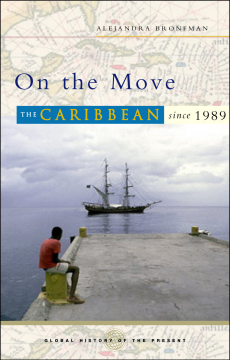
Additional Information
Book Details
Abstract
The Caribbean stands out in the popular imagination as a 'place without history', a place which has somehow eluded modernity. Haiti is envisioned as being trapped in an endless cycle of violence and instability, Cuba as a 1950s time warp, Jamaicans as ganja-smoking Rastafarians, while numerous pristine, anonymous islands are simply peaceful idylls. The notion of 'getting away from it all' lures countless visitors, offering the possibility of total disconnect for the world-weary.
In On the Move Alejandra Bronfman argues that in fact the opposite is true; the Caribbean is, and has always been, deeply engaged with the wider world. From drugs and tourism to international political struggles, these islands form an integral part of world history and of the present, and are themselves in a constant state of economic and social flux in the face of global transformations.
Alejandra Bronfman is Associate Professor in the Department of History at the University of British Columbia. She has travelled extensively in the Caribbean, and is the author of Measures of Equality: Social Science, Citizenship and Race in Cuba, 1902-1940 (2004) in addition to several articles on Caribbean history.
‘Alejandra Bronfman concisely and elegantly demonstrates the continued enmeshing of Caribbean nations and people with the world beyond the Caribbean Sea. This book provides a very useful introduction to the contemporary Caribbean.’
Diana Paton, Newcastle University
Table of Contents
| Section Title | Page | Action | Price |
|---|---|---|---|
| Contents\r | v | ||
| Acknowledgments | vi | ||
| Map: The Caribbean Basin | vii | ||
| Map: Greater and Lesser Antilles | viii | ||
| Introduction | 1 | ||
| A very brief history | 3 | ||
| Circulations | 6 | ||
| The chapters | 11 | ||
| 1 | Transporting citizenship | 15 | ||
| Early migrations | 20 | ||
| Politicization and recognition | 22 | ||
| Looking homeward | 26 | ||
| Aristide’s return and the vagaries of neoliberalism | 28 | ||
| Migration and desperation | 30 | ||
| Migration and conspiracy | 34 | ||
| Influence, fragmentation, violence | 35 | ||
| Conclusion | 38 | ||
| 2 | Sell it to save it | 39 | ||
| Negotiating socialism | 41 | ||
| Tourism | 46 | ||
| Mining | 50 | ||
| Biotech | 51 | ||
| More tourism | 55 | ||
| Left turns | 56 | ||
| Left behind | 59 | ||
| Conclusion | 62 | ||
| 3 | The traffic | 63 | ||
| How ganja came to Jamaica | 64 | ||
| The rise of cocaine | 66 | ||
| Popular politics and the culture of ganja | 67 | ||
| Clientelism and the politics of violence | 69 | ||
| Strategies of survival | 71 | ||
| Dealers needed | 72 | ||
| Cocaine returns | 73 | ||
| Flows and interdictions | 75 | ||
| Crack goes to Europe | 77 | ||
| Effects at home | 78 | ||
| One man’s story | 81 | ||
| Ongoing battles | 82 | ||
| Epistemology of drugs | 83 | ||
| Conclusion | 84 | ||
| 4 | Wired on the islands | 86 | ||
| Cellular phones | 87 | ||
| Internet | 89 | ||
| Education | 92 | ||
| Data processing | 96 | ||
| Labor and gender | 99 | ||
| Offshore money | 101 | ||
| Gambling | 103 | ||
| Conclusion | 107 | ||
| Conclusion: on history | 108 | ||
| Notes | 119 | ||
| Further reading | 122 | ||
| Index | 126 |
